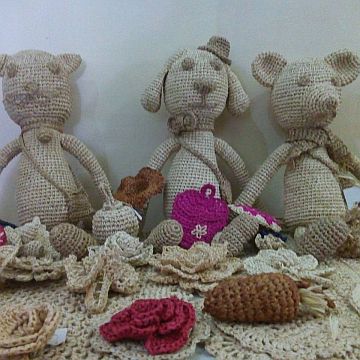
The handmade bags of Sulci Handicrafts Trading are being exported to Japan.
CDN PHOTO/VICTOR SILVA
Teacher-turned-entrepreneur aims to make Carcar City as Cebu’s handmade bags capital
Before it became a city, Carcar was considered as one of the oldest towns in the Philippines.
Located 39 kilometers south of Cebu City, Carcar hosts some of the only few heritage houses left in the province as well as other Spanish- and American-period structures.
The city is also known for local delicacies such as the famous Carcar chicharon, lechon, ampao, bucarillo, gogorias, and puso.
And if Marikina is known as the shoe capital of the Philippines, Carcar is tagged as the shoe capital of Cebu.
While the city is already known for all these things, a Carcar-based handicrafts maker wants to take it a step further by marketing the place as a source of high-quality handmade bags and other fashion accessories.
Originally intended to export crocheted bags to Japan in 2014, Sulci Handicrafts Trading has expanded to cater to the growing domestic market as well.
“We hope one day, Carcar will also be known as the home of handmade bags,” Lucil Barbieros, owner of the handicrafts venture, told Cebu Daily News.
The name Sulci comes from the old Cebuano word for “sew,” Barbieros explained.
Sulci was registered in Japan in 2014, but was only recognized by regulatory government agencies in the Philippines in 2015.
At present, the company sells its products to a furniture and housewares company based in Cebu City, a luxury resort in San Fernando town, and a shipbuilding firm in Midwest Cebu.
“There really is a growing domestic demand. More and more people are becoming aware of our products,” she said.
While Sulci sells other items such as place mats, stuffed toys, and hats, its main products are all-natural, crocheted bags with the Bohol-sourced buli palm tree buds used as raw material.
Each bag currently sells for at least P2,000, but these cost more in Japan, Barbieros said.
She cited high labor costs and the meticulous way to make the bags.
She said the simplest design for the bag would take two days to make, while the more complicated designs would take 7 to 10 days to make.
“The bags are popular among the elite, since they can afford it. It’s also a hit with those who love handmade products. But when you think about it,
when a customer buys our products, they are not only buying, but they are also helping our women workers,” said Barbieros.
Sulci currently employs 24 women, aged 22 years old to 73 years old, most of whom come from poor families in Carcar City.
The company produces 120 bags each month.
Lucil Barbieros, co-owner of Sulci Handicrafts Trading, is a teacher-turned-entrepreneur, who ventured into the handmade bags business based in Carcar City.
CDN PHOTO/VICTOR SILVA
Partnership
Sulci was formed through Barbieros’ partnership with a Japanese businesswoman named Satomi Sekiya, whom she first met in 2011.
During that time, Sekiya had just closed down her 25-year-old buy-and-sell business of cat-related items and was looking to do something else.
The 49-year-old Barbieros, who used to run a delicacy business, was also seeking other opportunities after facing hurdles in her last venture — which was mainly having not enough capital to sustain the growth of the business.
Barbieros, who is a teacher by profession, recognizes the impact educators have on the lives of others, but she believed that she could help more people by becoming an entrepreneur.
Ampao vendors
So when she went into the business of making handmade bags, the people she recruited were women, who sold sweet puffed rice cake or ampao in the city — the people she wanted to help.
Sekiya, a 67-year-old designer, on the other hand, wanted to follow the principle of fair trade — a social movement whose stated goal is to help producers in developing countries have better trading conditions and to promote sustainable farming.
When the two met through the Southern Partners and Fair Trade Corp. (SPFTC) some four years ago, Barbieros said she grabbed the opportunity and took Sekiya as her partner.
Investment
The business is registered under Barbieros’ name, but investments were shelled out by Sekiya, which the owner said have reached almost P10 million in the last five years.
She added that they were also looking at displaying their products in malls in Cebu City as well.